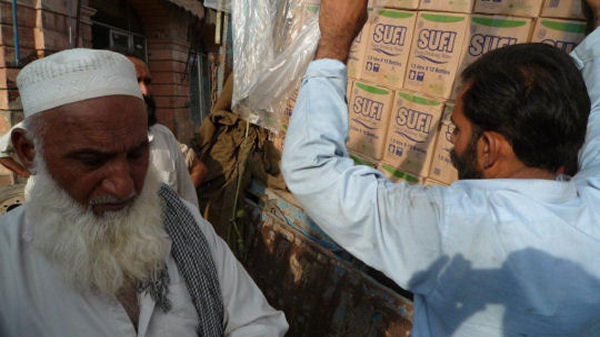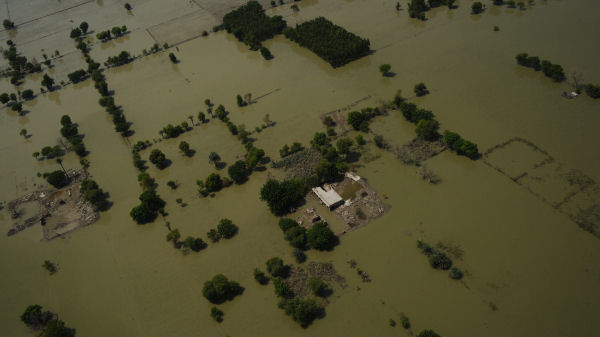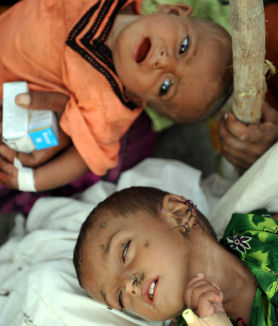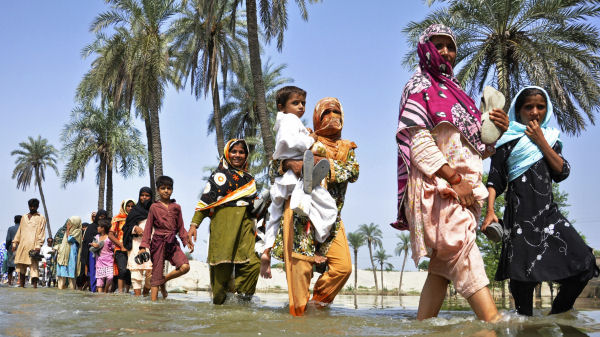Assessing the devastation of the Pakistan floods
Channel 4 News Foreign Affairs Correspondent Jonathan Miller meets the survivors who have “lost everything” in Pakistan’s devastating floods.

In one of the many depressing tours I’ve had of half-ruined, waterlogged villages in northwest Pakistan, I found a man washing his car.
He had a hose pipe out and he was cleaning off smears of mud on his white Nissan – which he clearly loved very much.
He waved a “hello” to me and I waded over, with Graham, our cameraman, shin deep, in stinking brown flood-water.
We were greeted by a scene as absurd as it was it was comic – as it was tragic.
The outside of Mr Abdullah’s car was now gleaming. With his cloth, he was polishing his wing-mirrors, as though his behaviour was perfectly normal. He reminded me of that old ad of a man standing proudly by his shiny black Morris Minor.
The inside of Mr Abdullah’s car was not just caked in mud: it was full of mud – and all sorts of other disgusting monsoon backwash.

The vision of Mr Abdullah’s sparkling Nissan has stayed with me. I raised it with Graham.
“You know,” he said, “I keep thinking of him too. I suppose it’s just one of those weird things people do when they’re dazed and numb after going through a cataclysmic experience.”
That was it. Of course! With hindsight, it seems ridiculous that it took so long for it to occur to me that Mr Abdullah was probably exhibiting the symptoms of post-traumatic stress disorder.

People have ‘lost everything’
And no wonder. His life, like those of 16 million other Pakistanis – that now widely-quoted figure still seems incomprehensible to me – has been up-ended.
No flood insurance in Charsadda or in any of the thousands of half-drowned towns and villages the length of this country. These people have lost everything and just have to start again.
I will find it hard to forget the sight of two burqa-clad women throwing themselves into the path of our 4WD, in their desperation to get help.

And the young man who asked me if I had any medicine – and when I asked what was the matter, he pulled up his shalwar to show me a swollen, green, festering gash on his leg which he’d got from a nail as he tried to salvage a few meagre possessions from his broken, flooded-out house. I directed him towards the Islamist-run medical post I’d seen up the road.
During my first few days I was here, I was constantly amazed to be visiting place after place which no relief worker had even reached yet. Each time we found somewhere like this, we reported it to UN agencies and independent relief groups, to direct their assessment teams.

Scale of catastrophe
As with the story of Mr Abdullah, it’s only now that it’s actually dawning on me that our experience of constantly stumbling across these unreached people was simply a reflection of the scale of the catastrophe.
There are just too many places to go to, too many people affected and aid agencies, like the government and the army, are simply overwhelmed.
Those not exhibiting the symptoms of PTSD are quietly dealing with the reality of having their lives turned upside down. For Salim Khan from Hasinabad, it was a lot to take in.
He quietly told me that it had taken him 20 years to get where he’d got to in life, with his house and his fridge and TV, his CD player, five electric fans, his washing machine and all his wife’s jewellery. There are 16 million people bearing such losses stoically, literally dispossessed.
Salim, and others I met, weren’t so much fatalistic about their misfortune; they were actually positive about how all this was a timely reminder from Almighty Allah about the transient nature of life and the ephemeral nature of materialism.
And yes, they really are that deep about it, even in the most remote rural areas. “God gives, and God takes away,” they refrain.
In the home of the family we featured in our report on Sunday night, with the two little girls and the seven-month-old baby, one of the few items they’d salvaged was a sign that used to hang over their front door. It was broken in half now, but the father, Fazal Elhi, was going to stick it together again. It read: “Wallah-hu khairun raziqeen” – “Allah is the provider for the people.” It was what made their home feel like home.

Generosity
As those who travel to humanitarian disaster zones know only too well, the thing that really chokes you up is the generosity of the dispossessed. Sometimes people insist that you just sit down and drink tea with them, sometimes it’s food that’s on offer. Excuses about journalistic deadlines are crass.
To sit with them seems to provide them with a sense of dignity, something they’ve been robbed of; there is a self-esteem-sapping powerlessness that comes with losing control over your life. To be able to give something to others is a life-affirming statement of your retaining control of your life and your destiny.
One day we were in a village and I was talking to some men about what had happened to them. Nevine, my producer, had disappeared for a while and when she turned up, her (mud-splattered) shalwar khameez (which she wears for practicality’s sake as much as out of respect for local cultural tradition) was adorned with an embroidered green shawl.
“I was given it by the old lady up there,” she said, pointing to a nearby roof-top. Sure enough, a woman – who looked like she was probably in her 70s – was looking down, surveying things from the flat roof that was now her home. She had rigged up a plastic sheet to sleep under. “She insisted I take it. They draped it over my shoulders and someone said in English ‘It’s a present.'”
Most people’s clothes have been washed away with the flood. Many times, people have told me that all they’ve got left in the world are the clothes they stand up in. All around, muddy, torn clothes were hanging out to dry; the shawl was clean and pristine. It had been a treasured possession.

Survival against the odds
When I was a child, I used to read the “Drama in Real Life” stories in Reader’s Digest; tales of survival against the odds. I’ve listened to a hundred such stories this past week. But there’s one in today’s Dawn newspaper which would definitely have made it into the now defunct publication. It’s headlined: “Bhoori, the swimming cow, saved old woman.”
Bhoori it turns out, saved Zainab Bibi, a 70-year-old woman with – wait for it: eight daughters, six sons and 16 grandchildren. Zainab was swept away, along with Bhoori, by a sudden surge of floodwater. She couldn’t swim, so she clung to the cow’s neck for hours through the night as Bhoori swam heroically through the raging floodwater, until finally, the following morning her feet touched the ground. “Allah Saeen Karam Karaisy na Bhoori,” she told Dawn’s reporter. “Almighty Allah will bless our Bhoori.”
The Islamist charity foundations, who are all over the place, cooking and rescuing, tell people that the flood is punishment from Allah for their waywardness. This harsh Salafist interpretation of events is an ideology that’s clearly taking root in the areas we’ve been to, thanks to the fact that the charities which preach this message are the only ones there for people in their time of trouble. Government agencies are nowhere to be seen. Anywhere.
US army in Pakistan
We witnessed the counter-offensive to the Islamist PR surge when we joined the 3rd Combat Aviation Brigade in their Chinooks yesterday, dispensing aid in villages which had been cut off since the flood. The image of the US soldiers, armed and in full battledress and straight in from Baghram Airbase in Kabul, gently helping burqa-clad grannies from Swat up the huge helicopter’s back gangplank is another of those indelible memories. To the children from Upper Swat, the airmen – with their helmets, dark goggles and masks – must have looked like Martians.
While I was off interviewing someone later, Nevine talked to the crew at a forward refuelling base they’d just set up. “Oh man, I love not being in Afghanistan,” one of the airmen told her. “It’s like you can just breathe here.” He wasn’t just referring to the fresh mountain air. This was a crew whose combat tour had already lasted eleven months. For them, helping out in a natural disaster zone was like R&R. “Don’t you just love the scenery?” another soldier said. “It’s so beautiful here.”

I too have been struck by the physical beauty of many of the places I’ve been – and indeed by the handsomeness of the people of Khyber Pakhtunkhwa, many of whom have those amazing-coloured eyes, which are mesmerising. The trouble is, the physical beauty of the landscape has been trashed by the flood, and in most of the little villages I’ve passed through I’m left just imagining what it must have looked like, by the balmy tree-lined riverside, before the filthy water rose.
It’ll take both the place and the people a long time to get over this one.
-
Latest news
-
Trump hush money trial: Defence gives closing arguments4m

-
‘Children should be educated with survival skills’, says Leeds Young Conservatives chairman3m

-
The Estonian teenagers training for conflict and crisis5m

-
‘There’s an overwhelming sense of fear and panic,’ in Rafah says Red Cross3m

-
Israel Hamas war: Tanks move into central Rafah as thousands flee3m

-




